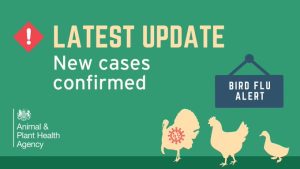Avian Influenza outbreak in south Shropshire
Wednesday 1 June 2022 5.45pm

Shropshire Council’s animal health team have today (Wednesday 1 June 2022) been notified of an outbreak of Avian Influenza within a turkey farm in the south Shropshire area.
As a result of this restriction, monitoring and surveillance zones will be implemented around the Wooferton area and we ask residents and businesses who house birds to remain on alert for any signs of disease and report any cases of suspected disease immediately, whilst ensuring good levels of biosecurity at their premises.
The following advice will assist you identifying and reporting any potential cases:
Spot the signs of Bird Flu
- Unusual quietness, decreased activity levels
- Decreased levels of vocalisation.
- Decreased levels of feed & water consumption
- Decreased egg production
- My bird is sick what should I do?
If you are concerned about the health of your animals, please seek advice from your vet.
For more information about bird flu and biosecurity, visit the Defra website at https://www.gov.uk/guidance/avian-influenza-bird-flu or phone to report any of the above symptoms in birds on 03459 33 55 77 for the Defra Helpline.
Advice for bird keepers
Biosecurity actions for poultry keepers (both commercial and recreational/back yard keepers)
There are some simple measures that all poultry keepers should take to protect their birds against the threat of avian flu. These apply to people running a large commercial farm, keeping a few hens in their back garden and those rearing game birds. These include:
- Keep the area where birds live clean and tidy, control rats and mice and regularly clean and disinfect any hard surfaces
- Keep chickens and turkeys completely separate from ducks and geese
- Conduct regular maintenance checks on their sheds
- Clean moss off the roofs, empty gutters and remove vegetation between sheds where birds are kept
- Draw up contingency plans for storing bedding and dealing with pests
- Place birds’ feed and water in fully enclosed areas that are protected from wild birds, and remove any spilled feed regularly
- Put fencing around outdoor areas where birds are allowed and limit their access to ponds or areas visited by wild waterfowl
- Clean and disinfect footwear before and after entering premises where birds are kept
- Avian influenza is not air-borne, except over very short distances. It is spread by movement of infected birds or contact with respiratory secretions and in particular faeces, either directly or through contaminated objects, clothes and vehicles.
Avian influenza is primarily a disease of birds. While transmission of avian influenza viruses to people is extremely rare and transmission may occur as a result of direct contact with infected poultry or other birds or their faeces and can cause illness in the human population.
Whether you keep just a few birds or thousands, you are now legally required to do this on your farm or small holding. It is in your interests to do so in order to protect your birds from this highly infectious disease.
Wild birds migrating to the UK from mainland Europe during the winter months can carry the disease and where wild birds are allowed to mix with domestic poultry this can lead to the disease spreading to captive birds.
UK Health Security Agency has confirmed that the risk to public health is very low and the Food Standards Agency has said that bird flu poses a very low food safety risk for UK consumers and it does not affect the consumption of poultry or eggs.
We advise the public to take note of any road closures, restriction and monitoring zones which will be set up to ensure biosecurity.

